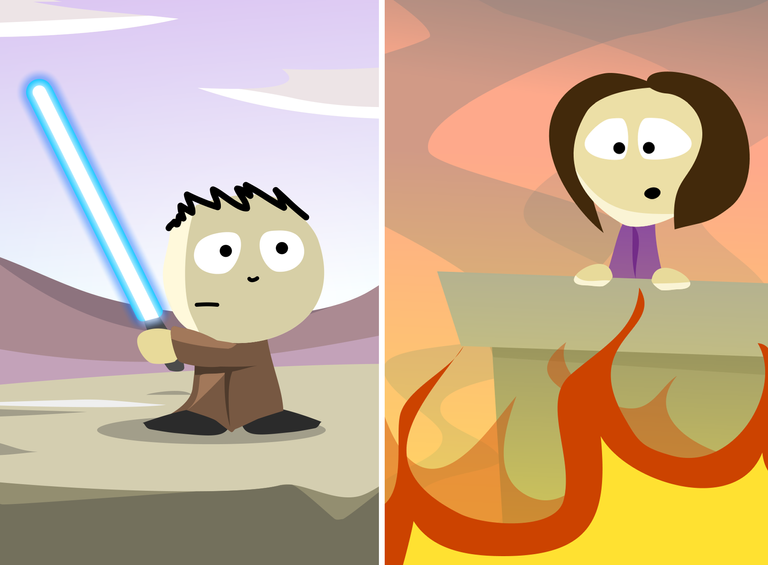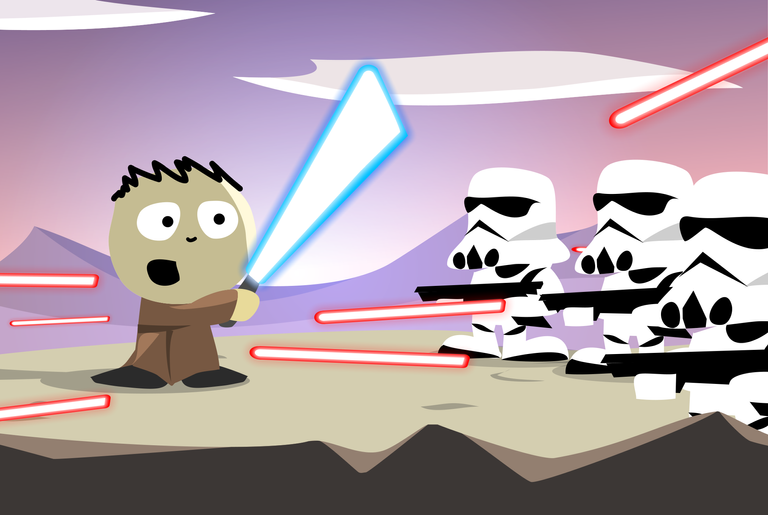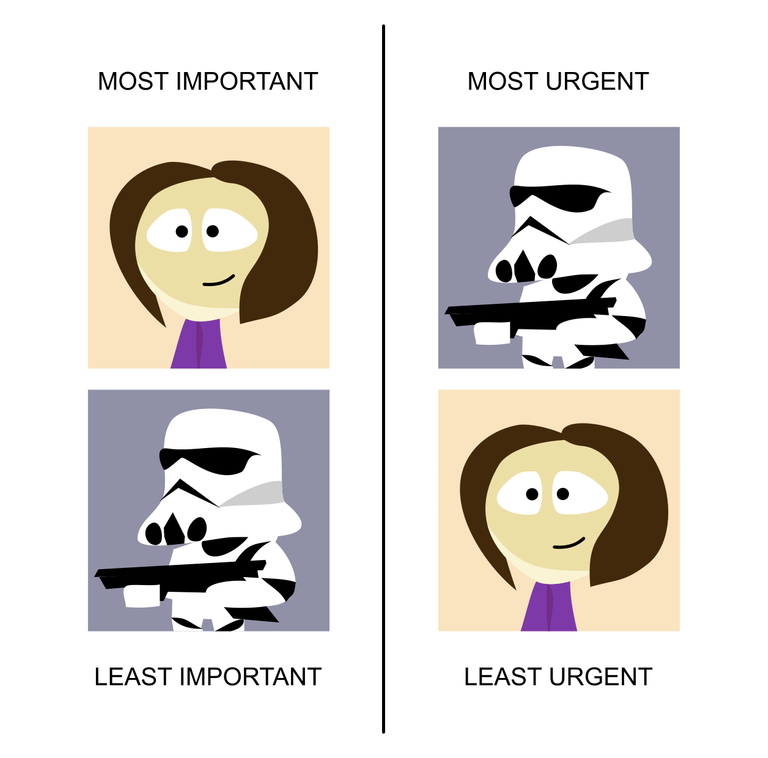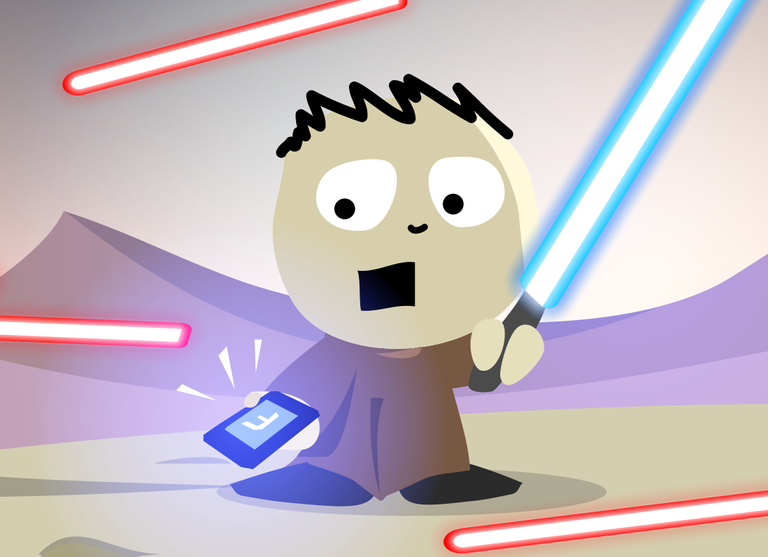Imagine you were a Jedi master called Bob (your parents, whilst skilled in the ways of the force weren’t the best at choosing names). The love of your life – Princess Lucia – is trapped in a burning building as you hurry to save her.

You might think of Lucia as the embodiment of your dreams, your aspirations – she is your most important thing.
Unfortunately, before you can reach her an army of stormtroopers open fire. The incoming stream of lasers demand your attention – if you fail to dodge them, you’re dead. You might think of them as an urgent distraction from saving your princess.

We all know how a hero resolves this dilemma. If he takes his eye off the ultimate goal – his princess – then all his other efforts are for nought. He can engage an army of stormtroopers, cutting them down with graceful ease, but their numbers are limitless, and whilst momentarily satisfying they only distract him. Delayed too long, his princess will die.
And so it is with your life. You have things that are most important and things that are most urgent in permanent competition:

The secret to mastering your time is to systematically focus on importance and suppress urgency. Humans are pre-wired to focus on things which demand an immediate response, like alerts on their phones – and to postpone things which are most important, like going to the gym. You need to reverse that, which goes against your brain and most of human society.
Look at what you spend your day doing. Most of it, I’ll warrant, is not anything you chose – it’s what is being asked of you. Here’s how we fix that, young padawan:
Say no. Most of us follow an implicit social contract: when someone asks you to do something you almost always say yes. It may feel very noble, but don’t forget there’s a dying princess you need to save, and you just agreed to slow yourself down because you were asked nicely. You may need to sacrifice some social comfort to save a life (as a bonus, people tend to instinctively respect those who can say no).
Unplug the TV. I haven’t had a TV signal for 7 years, which has given me about 12,376 hours more than the average American who indulges in 34 hours a week. I do watch some shows – usually one hour a day whilst eating dinner – but only ones I’ve chosen and bought. You can do a lot with 12,000 hours, and still keep up with Mad Men.
Kill notifications. Modern technology has evolved to exploit our urgency addiction: email, Facebook, Twitter, Quora and more will fight to distract you constantly. Fortunately, this is easily fixed: turn off all your notifications. Choose to check these things when you have time to be distracted – say, during a lunch break – and work through them together, saving time.

Schedule your priorities. Humans are such funny critters. If you have a friend to meet, you’ll arrange to see them at a set time. But if you have something that matters to you more than anything – say writing a book, or going to the gym – you won’t schedule it. You’ll just ‘get round to it’. Treat your highest priorities like flights you have to catch: give them a set time in advance and say no to anything that would stop you making your flight.
First things first. What is the single most important (not urgent) thing you could possibly be doing? Do some of that today. Remember there’s a limitless number of distracting stormtroopers – don’t fool yourself by thinking “if I just do this thing first then I can”. Jedi don’t live by excuses.
Less volume, more time. There’s always millions of things you could be doing. The trick is to pick no more than 1 – 3 a day, and relentlessly pursue those. Your brain won’t like this limit. Other people won’t like this limit. Do it anyway. Focusing your all on one task at a time is infinitely more efficient than multi-tasking and gives you time to excel at your work.
Ignore. It’s rude, unprofessional and often utterly necessary. There are people you won’t find time to reply to. There are requests you will allow yourself to forget. You can be slow to do things like tidy up, pay bills or open mail. The world won’t fall apart. The payoff is you get done what matters.
One final lesson from the Jedi: they’re heroes.
Heroes inspire us for many reasons: they make tough decisions, they keep going and they get done what matters. But there’s another reason we love our heroes. Inside us all, we know we have the power to become one ourselves.
Not indicating that the content you copy/paste is not your original work could be seen as plagiarism.
Some tips to share content and add value:
Repeated plagiarized posts are considered spam. Spam is discouraged by the community, and may result in action from the cheetah bot.
Creative Commons: If you are posting content under a Creative Commons license, please attribute and link according to the specific license. If you are posting content under CC0 or Public Domain please consider noting that at the end of your post.
If you are actually the original author, please do reply to let us know!
Thank You!
Hi! I am a robot. I just upvoted you! I found similar content that readers might be interested in:
https://www.forbes.com/sites/quora/2013/01/30/how-does-one-manage-time-more-effectively/
This was pretty awesome!!
What's interesting is how much discipline needs to go into scheduling time for yourself. For me at least, it comes and goes in waves. Sometimes I'm great at it -- I'll spend months working towards a project, and see the work very clearly pay off! Aaand... then I slow down. I go back to my bad habits and try to tackle 2395 tasks at once rather than 1-3 important ones for the day, and end up doing very little for another half year.
But I guess that's where the analogy kicks in. Jedi are constantly training. It's not just a thing you do for a little while on and off -- it requires constant dedication and attention to the way of the force.